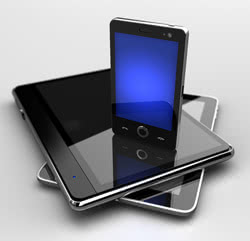Mobile Business Apps
Preparing Your Office For BYOD

If you’ve ever brought your personal cellphone, laptop or other mobile device to the office and used it for work-related purposes then you’ve had a hand in the developing BYOD trend.
BYOD, or Bring Your Own Device, refers to the office policy of employees at an enterprise being permitted to use their own personal devices to integrate into the company resources and network. There many distinct advantages and risks that come with deregulating the sorts of devices that access company assets, but regardless of them, BYOD continues to be a policy pursued at an increasing amount of organizations. A 2012 survey by Avanade found that 88 percent of respondent companies had employees using personal devices for work purposes, with 60 percent currently adapting their IT infrastructure to address that reality.
In this article we’ll provide a few tips and recommendations on how to best accommodate BYOD and ensure it becomes a net benefit for your team.
Know your network
This is one that should be at the top of your docket regardless. No ill ever came of knowing just exactly what your IT infrastructure is and isn’t capable of. In essence, BYOD is a manifestation of what’s referred to as the “consumerization” of IT, meaning that the devices by which users access the network are increasingly not top-down, standard issue workstations or other items.
A standardized system is far easier for an IT team to manage (everyone has the same equipment accessing the network in the same ways) and prescribe top-down solutions on, but the fact that often gets overlooked is that modern devices like smartphones and tablets provide the opportunity for more dynamic and flexible. The Apple and Android stores organize different apps into easily searchable databases that can download critical updates automatically without any downtime. A company that knows its IT capabilities can craft a system that takes advantage of the hardware capabilities.
Define your policy
Security issues are and will continue to be a serious issue facing BYOD for the foreseeable future, but headaches can be minimized by provided a clear and explicit guidelines for what is and isn’t permitted in terms of what kinds of devices can be used, which resources they can access and what sort data they can upload or store.
One important caveat to keep note of is that when someone leaves a company, they bring their devices with them. Those devices can carry vast amounts of vital company data including cached database login information, confidential emails and any number of other things. Because of that it’s absolutely vital for a BYOD policy to include measures for securing data (encryption, provisions for VPN access) off of outbound devices and worst-case scenarios like device loss or theft.
Account for mobility
Since the vast majority of devices that employees will be bringing in are compact ones like smartphones and tablets, the opportunities for unchaining people in various departments from their desks while still being able to access relevant data and execute their duties is great.
On the enterprise software front we’ve seen a steady uptick in solutions geared specifically towards mobile platforms or have a mobile app extension of their primary application. Some of these extensions, like our top 10 worst mobile business apps, leave a lot to be desired, but others, like mobile CRM solution Savi People are raising the bar, a fact we’ve written about in our Mobile Business Apps reviews.
Account for compatibility
With the ongoing competition of Google Android and Apple iOS mobile operating systems and the relative lack of compatibility between them (depending on the application or format) it pays to do your homework and ensure that your enterprise software solutions are compatible with the maximum amount of devices being brought to the office.





